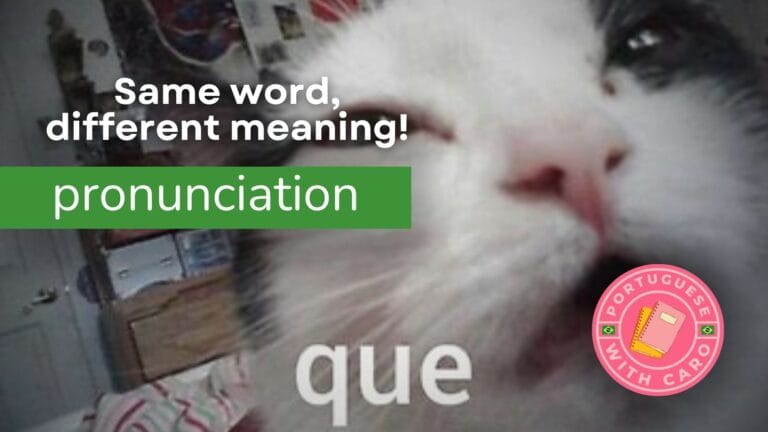MPB (Música Popular Brasileira) is one of the most beloved genres in Brazil. It emerged in the 1960s, blending traditional Brazilian rhythms like samba and bossa nova with international influences. Unlike sertanejo, which often focuses on country life and romance, MPB is known for its poetic lyrics, social and political themes, and deep emotional expression.
The lyrics in MPB can be more complex and metaphorical, so understanding the vocabulary will help you appreciate the music even more. Below, we’ll explore some of the most common words, slang, and expressions you’ll hear in MPB songs.
Common Words in MPB:
Saudade
Aquele sentimento profundo de falta de algo ou alguém; um misto de tristeza pela falta e felicidade pela lembrança boa. É uma palavra única do português, muito presente no MPB.
That deep feeling of missing something or someone; a mix of sadness due to the absence and happiness due to the good memory. It is a unique word in Portuguese, very present in MPB.
🎶 “E por falar em saudade
Onde anda você?” 🎶
“And speaking of longing
Where are you?”
Esquina
O cruzamento entre duas ruas.
The intersection of two streets. Street corner.
🎶 “Ando por aí querendo te encontrar
Em cada esquina, paro em cada olhar.” 🎶
“I walk around wanting to find you
At every corner, I stop at every glance.”
Juventude
Período da vida entre a infância e a idade adulta.
The period of life between childhood and adulthood. Teen days.
🎶 “Hoje eu sei que quem me deu a ideia
De uma nova consciência e juventude
Tá em casa guardado por Deus.” 🎶
“Today I know that whoever gave me the idea
Of a new consciousness and youth
Is at home, kept by God.”
Acaso
Algo que acontece de maneira imprevisível ou sem planejamento.
Something that happens unpredictably or without planning.
🎶 “Porque eu te amo
E não consigo me ver sem ser o teu amor por anos
Não é acaso, é só amor.” 🎶
“Because I love you
And I can’t see myself without being your love for years
It’s not a coincidence, it’s just love.”
Queixa
Reclamação ou expressão de insatisfação sobre algo ou alguém.
Complaint or expression of dissatisfaction about something or someone.
🎶 “Várias queixas de você
Por que fez isso comigo?” 🎶
“Several complaints from you
Why did you do this to me?”
Dum
Forma reduzida e informal de “de um”. Muito usada na fala do dia a dia.
Shortened form of “de um”, commonly used in spoken Portuguese.
🎶 “É que eu sou dum lugar
Onde o céu molha o chão.” 🎶
“It’s just that I’m from a place
Where the sky wets the ground.”
Bastar
Significa ser suficiente, não precisar de mais nada além daquilo. Pode ser usado para falar de quantidade, sentimentos ou situações.
To be enough, to not need anything more. It can be used for quantity, feelings, or situations.
🎶 “Palavras não bastam, não dá pra entender.” 🎶
“Words are not enough, it’s not possible to understand.”
Filho único
Uma pessoa que não tem irmãos, ou seja, é o único filho dos pais.
A person who has no siblings, that is, is the only child of his or her parents.
🎶 “Minha mãe não dorme
Enquanto eu não chegar
Sou filho único
Tenho minha casa pra olhar.” 🎶
“My mother doesn’t sleep
Until I get home
I’m an only child
I have to take care of my house.”
Aposentado
Estar sem atividade ou descanso, geralmente usado para descrever alguém que parou de trabalhar.
To be without activity or rest, usually used to describe someone who has stopped working. Retired.
Slangs & Idioms in MPB:
Moleza
Algo muito fácil ou relaxado. Também usado para descrever uma atitude relaxada e fraca.
Something very easy or relaxed. Also used to describe a laid-back attitude.
🎶 “Fácil achar o caminho a seguir
Num mapa com lápis de cor
Moleza mandar a tropa atacar
Da tela do computador.” 🎶
“It’s easy to find the way forward
On a map with colored pencils
Easy to send the troops to attack
From the computer screen.”
Malandro
Uma pessoa carismática e esperta que sabe como navegar pela vida através do charme e da sagacidade. Frequentemente associada à cultura do samba.
A street-smart, charismatic person who knows how to navigate life through charm and wit. Often associated with samba culture.
🎶 “Malandro de fato
É um cara maneiro
Que não se amarra
Em uma só mulher…” 🎶
“Rogue, indeed
He’s a cool guy
Who doesn’t get tied down
To just one woman…”
Correr contra o tempo
Fazer algo com pressa ou tentar encerrar uma atividade dentro de um prazo.
Doing something in a hurry or trying to finish an activity within a deadline. “To race against time / against the clock”.
🎶 “Também não é sobre correr contra o tempo pra ter sempre mais
Porque quando menos se espera a vida já ficou pra trás.” 🎶
“”Nothing brings down a peão in love.””It’s also not about racing against time to always have more
Because when you least expect it, life is already behind you.”
Não vejo a hora
Expressão usada para dizer que está ansioso por algo.
An expression used to say you’re looking forward to something.
Largar a mão
Parar de insistir em algo, desistir de uma ideia ou comportamento.
Parar de insistir em algo, desistir de uma ideia ou comportamento.
🎶 “Você tem que largar a mão do não
Soltar essa louca, arder de paixão.” 🎶
“You have to let go the no
Let go of this crazy woman, burn with passion.”
Cheguei ao ponto
Expressão usada para indicar que alguém atingiu um nível extremo de algo.
Expression used to indicate that someone has reached an extreme level of something. “I got to such a point”.
🎶 “Já cheguei a tal ponto
De me trocar diversas vezes por você
Só pra ver se te encontro.” 🎶
“I’ve reached the point
Of exchanging myself for you several times
Just to see if I can find you.”
Ficou pra hoje
Algo que deveria ter sido feito antes, mas foi adiado. A expressão é adaptada para o dia adiado, como: ficou pra amanhã; ficou pro mês que vem; fica pra próxima semana.
Something that should have been done before, but was postponed. The expression is adapted to the day that was postponed, such as: it was postponed until tomorrow; it is postponed until next month; it is postponed until next week.
🎶 “Não vejo a hora de te encontrar
Continuar aquela conversa
Que não terminamos ontem
Ficou pra hoje.” 🎶
“I can’t wait to meet you
To continue that conversation
That we didn’t finish yesterday
We postponed for today.”
Fazer por onde
Se esforçar para merecer conseguir algo ou um relacionamento.
Striving to deserve to achieve something or a relationship. “I promise, now I’ll do what it takes”.
🎶 “Você bem que podia perdoar
E só mais uma vez me aceitar
Prometo, agora vou fazer por onde
Nunca mais perdê-la.” 🎶
“You could forgive me
And just accept me once more
I promise, now I’ll do everything I can to
Never lose you again.”
Nêga / Nega
Gíria informal e carinhosa para se referir a uma mulher, especialmente em contextos de relacionamento romântico. Embora seja usada de forma afetuosa, é bom ficar atento ao contexto, pois pode ter uma conotação histórica de opressão, frequentemente associada à mulher negra.
Informal and affectionate slang to refer to a woman, especially in romantic relationships. Although it is used affectionately, it is important to be aware of the context, as it can have a historical connotation of oppression, often associated with black women.
Nego / Nêgo / Negão
Gíria informal e carinhosa usada para se referir a um homem, geralmente em contextos afetivos ou românticos. Embora tenha uma conotação de afeto, é importante notar que, historicamente, essa palavra carrega também um peso relacionado à opressão, especialmente quando se refere ao homem negro.
Informal and affectionate slang used to refer to a man, usually in affectionate or romantic contexts. Although it conveys affection, it’s important to note that historically, the word also carries connotations of oppression, particularly when referring to a black man.
🎶 “Negão, eu tô com medo
Que isso seja amor.” 🎶
“Black boy, I’m scared
That this is love.”
Feliz da vida
Expressão que indica uma felicidade plena, satisfação com a vida, alegria espontânea.
Expression that indicates complete happiness, satisfaction with life, spontaneous joy.
🎶 “Eu, o mais feliz da vida
Sou eu.” 🎶
“I, the happiest with the life
It’s me”
Meter o pé
Ir embora ou sair de um lugar, geralmente de forma rápida e decidida. Pode ter um tom de fuga, mudança ou simplesmente ir embora de um ambiente.
To leave or leave a place, usually quickly and decisively. It may have an undertone of escape, change, or simply leaving a place.
🎶 “Nunca mais teu pai falou: She’s leaving home
E meteu o pé na estrada like a rolling stone.” 🎶
“Your father never said again: She’s leaving home
And hit the road like a rolling stone.”
Não dar nada
Expressão usada para dizer que as pessoas não acreditam ou não tem expectativas sobre alguém ou algo.
Expression used to say that people don’t believe or have expectations about someone or something.
🎶 “Eu realmente não sei
O que eu fiz pra merecer você
Porque ninguém
Dava nada por mim.” 🎶
“I really don’t know
What I did to deserve you
Because no one
Cared for me.”
Fundo do poço
Expressão comum para descrever momentos difíceis.
Refers to hitting rock bottom or being in a very bad situation.
🎶 “É o fundo do poço, é o fim do caminho.” 🎶
“It’s rock bottom, it’s the end of the road.”
Dar água na boca
Expressão que indica desejo intenso, salivar de desejo, seja por algo saboroso ou por alguém.
Expression that indicates intense desire, salivating desire, either for something tasty or for someone.
🎶 “Meu bem, você me dá água na boca
Vestindo fantasias, tirando a roupa.” 🎶
“My dear, you make me salivate
Dressing up in costumes, taking off your clothes.”
Vida em jogo
Arriscar ou colocar algo muito importante em risco.
To risk or put something very important at risk.
🎶 “Não tenho juiz
Se você quer a vida em jogo, eu quero é ser feliz.” 🎶
“I have no judge
If you want your life at stake, I want to be happy.”
Segurar a barra
Enfrentar uma situação difícil de forma firme, sem desistir.
Face a difficult situation firmly, without giving up.
🎶 “Construíram uma casa há uns dois anos atrás
Mais ou menos quando os gêmeos vieram
Batalharam grana, seguraram legal
A barra mais pesada que tiveram.” 🎶
“They built a house about two years ago
More or less when the twins came
They fought for money, they held on tight
The hardest thing they had to do.”
Em vão
Algo feito sem sucesso, sem alcançar o resultado esperado.
Something done unsuccessfully, without achieving the expected result.
🎶 “Depois de varar madrugada
Esperando por nada
De arrastar-me no chão
Em vão.” 🎶
“After staying up all night
Waiting for nothing
To drag myself on the ground
Vainly.”
Como se não houvesse amanhã
Fazer algo intensamente, como se não houvesse oportunidade de fazer de novo, como se o mundo não existisse no dia seguinte para fazer aquilo de novo.
Doing something intensely, as if there were no opportunity to do it again, as if the world did not exist the next day to do it again.
🎶 “É preciso amar
As pessoas como se não houvesse amanhã
Porque se você parar pra pensar
Na verdade, não há.” 🎶
“You have to love people as if there were no tomorrow
Because if you stop to think
In fact, there isn’t.”
MPB is full of beautiful poetry, deep emotions, and unique expressions. Learning these words and phrases will help you connect with the music and understand its messages more profoundly.
Want to dive deeper? Check out my MPB playlist and let the music guide your learning! 🎶




